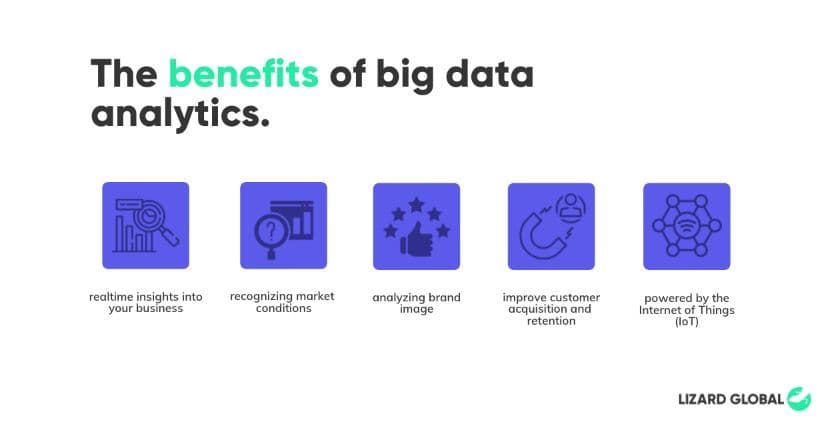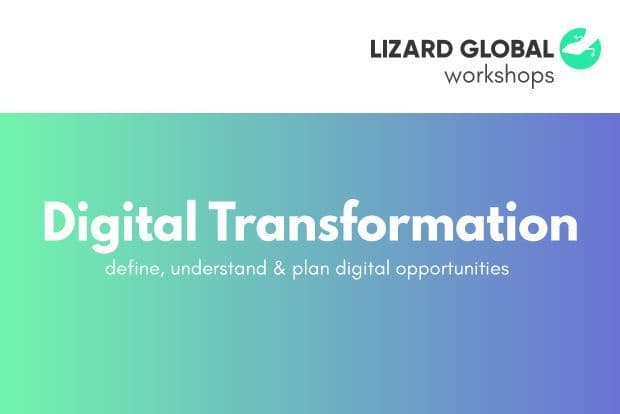big data
IoT
+ 2 more ...
What is Big Data? And Why Does it Matter for your Business?
14 Apr 2022
by Lotte, Digital Content Specialist
14 Apr 2022
by Lotte, Digital Content Specialist
big data
IoT
data analytics
digital transformation
What is Big Data? And Why Does it Matter for your Business?
Table of contents
Contact us
We will get back to you in the next 48 hours.

Big Data is booming and has been for a while already. And not without a reason. Big Data analytics can provide you with valuable insights into your target market and the needs of your customers.
What social media apps do you use on a daily basis? Twitter? Facebook? Instagram? TikTok? Or perhaps a combination of them? No matter which ones you’re using, you’re most definitely not the only one. On the contrary, social media apps are everywhere, and a lot of their users spend hours using them every day. As a result, data grows quickly. Every day, billions of users connect on social media platforms, sharing information, photos, videos, and much more. These massive collections of data that are being transferred non-stop are what we call “big data”.
This blog dives into the importance of big data technologies that can handle these large amounts of data very efficiently, and help businesses grow bigger and better than ever before. Curious how that works? Continue reading!
The importance of Big Data
With the emergence of modern technologies, data transfers are ever-increasing, which resulted in enormous chunks of data being distributed throughout online networks. These immense collections of data is what we call “Big Data”. To efficiently collect, sort, and manage this data, you'll need a one-of-a-kind data management platform. Here's when big data analytics comes in handy. It aids businesses in gaining data-driven insights from apps.
Big Data technology is used to process data in order to get valuable and real-time business information on productivity, performance, profit, users, shareholder value, and risks. Not only does this information give you a concrete insight into the status of your business, but it also provides you with feedback for making data-driven decisions to improve your business processes or certain features and functionalities in your application. Big data is a collection of data from many different sources and is often described by five main characteristics: volume, value, variety, velocity, and veracity.
Big Data for mobile apps
By this time, the approximate number of mobile app downloads lies somewhere around 250 billion. This big user base for mobile apps generates a lot of raw data. Raw or unstructured data requires a very high level of analytics in order to test the numbers and derive accurate and valuable information from them. That’s where Big Data comes into play. Mobile app developers can use Big Data techniques to collect, simplify, and evaluate large data sets in order to obtain insights into the behavior of their users and their unfulfilled needs. Using these insights, developers can create applications that are made to satisfy the user, based on their previous experience with the app.
Curious how we process data with Lean Analytics at Lizard Global? Check out this blog for more info or get in touch with our experts via our contact form to find out how we can help your business thrive on data.
Big data analytics: how does it work?
So, it’s clear that data can be incredibly valuable for the growth of your business. Once you get the hang of how to actually gather and analyze the data that matters most, you can start making data-driven decisions and tailored strategies to take your business to the next level and stay ahead of the competition. But how do big data analytics work exactly?
Data Gathering
Probably the most important part of big data analytics is the actual gathering of information about your customers. This is done mostly through apps like Instagram, Facebook, Twitter, YouTube, and even phone calls. When completing your profile on Facebook or sharing a picture with your friends and family on Instagram, you usually leave quite a trail of valuable information behind that businesses can use in order to get a better understanding of their customers and their needs.
Compatibility
After the relevant data has been gathered, it is processed in such a way that it doesn’t arrive in a big chunk of complex and unreadable batches of data. Instead, the countless encoded combinations of letters, numbers, and signs are being turned into information we can actually read. For example, in the form of a graph visualized on a data dashboard. This enables data analysts to gain a clear understanding of what their users actually need in order to achieve an optimized user experience.
Storage
After the data is being processed and made compatible with the software of the data analyst, it’s essential that that data is being stored somewhere in a database. After all, you’ll need to be able to access this valuable information at all times. Usually, this happens in the cloud, which is an online database that allows users to access the information that’s stored on it at any time, from anywhere, as long as they have a network connection.
Analysis
Once stored and neatly visualized into a graph or excel sheet, data analysts can start processing and analyzing the information at hand. The data is analyzed to get a better idea of the potentials and possibilities available to take a business to the next level and greatly optimize the customer and employee experience. Here is where data-driven decision-making comes into play, which forms an essential part of the practice of Lean Analytics. Lean Analytics is all about measuring progress through data while asking the following questions:
- What should we measure?
- How should we measure it?
- Why does this data matter?
The One Metrics That Matters (OMTM) is the most important tool we employ during the Lean Analytics process to assist select the proper KPIs matched to your solution and pinned targets. It all comes down to selecting the correct information to track at the right time, based on factors such as the current status of your business, the sort of business, and the industry in which you operate. The OMTM assists us in creating and encouraging focus, as well as keeping our team on track in terms of assessing progress and success.
Big data: the benefits
The value of Big Data isn't determined by the amount of data an organization possesses. Its significance stems from how the company uses the information received. Every business interprets the data it collects in its own way. The more successfully a company uses its data, the faster it will grow.

1. Realtime insights
Customers' needs change on a daily basis and at a rapid speed. They want something one-of-a-kind, and they expect firms to offer practical solutions. As a result, organizations' trends, requirements, and methodologies are continuously changing. Businesses are applying Big Data analytics to better the mobile app development process and stay up with continual change and new client needs. It gives you insight into the world of clients, including what they need and what can be useful to them. It looks promising because of the real-time data analysis. It enables organizations to make data-driven, real-time decisions that improve the user experience.
2. Recognizing market conditions
Big data research can help businesses obtain a better understanding of market dynamics. Analyzing customer purchasing behavior, for example, allows businesses to identify the most popular items and adapt them accordingly. This enables companies to keep ahead of the competition. High-quality programs are always meeting the needs of their customers. They're looking for low-cost mobile app development that can be handled. Big data allows you to study the vast data flow generated by customers on a daily basis.
In today's market, big data raises the needs of users. Furthermore, by seeing and analyzing the interactions and reactions of users from various lifestyles, locations, backgrounds, and age groups, you can generate concepts for high-quality and distinctive mobile applications.
3. Analyze brand image
Sentiment analysis can be performed using Big Data techniques. Businesses can use these techniques to learn more about the brand image of their company. Who is saying what about your company? Big data tools can assist firms in increasing their online presence. Organizations can use Big Data analytics to detect product references on social media networks. These references include complaints, dynamic material such as videos and photographs, and client reviews. Organizations utilize social media to reap the benefits of personal customer service and to respond to customers who mention them.
4. Improve customer acquisition and retention
Customers are a critical asset for any kind of business. No business can be successful unless it has a significant consumer base, resulting in a stream of valuable incoming information. But even with a large consumer base, organizations can still struggle with staying ahead of their competition, especially if they don’t really know what their clients need. This will eventually lead to the loss of valuable customers, which has a negative impact on the overall business growth. Big Data analytics can be used by businesses to detect customer-related trends and patterns. A successful business relies on customer behavior analysis.
The mobile app development market is rapidly growing. Apart from consumer requirements, developers have to perfectly understand how users engage with their mobile apps. By employing Big Data in the app development process, you can conduct a comprehensive analysis of the overall user experience. As a result, it produces a concrete and insightful report on user activity for each feature and functionality. You can uncover new strategies to sell your items if you get to know your clients better and learn how they interact with various social media platforms.
5. Powered by the Internet of Things
The Internet of Things (IoT) is booming and here to stay. With the incorporation of Big Data, IoT has had a major impact on mobile app development trends. With the right technology and Big Data, IoT offers a great way to advance through automation processes and stay ahead of competitors. By connecting equipment to apps, IoT allows users to greatly reduce time-consuming tasks. IoT devices aid in the collection of data from users as well as the analysis of that data to provide actionable awareness. These help developers create user-friendly, result-oriented programs with significant market impact.
Need a hand?
As mentioned before, at Lizard Global, we’re experts in Lean Analytics and helping our customers in developing strategies and products that bring their business to a completely new level. Together with you as the expert in your industry, we dive into your business processes, target audience, and competitors to find out how we can set up a system and strategy that collects the data that matters most for your organization. We don’t simply create solutions, we also help you integrate them into your existing business processes and teach you, step-by-step, how to read data and use it to make data-driven decisions that stimulate long-term growth.
Are you looking for a development partner that can help you create the right solution for your business, and help you get a better understanding of what data can do for your organization? Get in touch with our experts via the contact form on our website or contact us on WhatsApp.

Big Data is booming and has been for a while already. And not without a reason. Big Data analytics can provide you with valuable insights into your target market and the needs of your customers.
What social media apps do you use on a daily basis? Twitter? Facebook? Instagram? TikTok? Or perhaps a combination of them? No matter which ones you’re using, you’re most definitely not the only one. On the contrary, social media apps are everywhere, and a lot of their users spend hours using them every day. As a result, data grows quickly. Every day, billions of users connect on social media platforms, sharing information, photos, videos, and much more. These massive collections of data that are being transferred non-stop are what we call “big data”.
This blog dives into the importance of big data technologies that can handle these large amounts of data very efficiently, and help businesses grow bigger and better than ever before. Curious how that works? Continue reading!
The importance of Big Data
With the emergence of modern technologies, data transfers are ever-increasing, which resulted in enormous chunks of data being distributed throughout online networks. These immense collections of data is what we call “Big Data”. To efficiently collect, sort, and manage this data, you'll need a one-of-a-kind data management platform. Here's when big data analytics comes in handy. It aids businesses in gaining data-driven insights from apps.
Big Data technology is used to process data in order to get valuable and real-time business information on productivity, performance, profit, users, shareholder value, and risks. Not only does this information give you a concrete insight into the status of your business, but it also provides you with feedback for making data-driven decisions to improve your business processes or certain features and functionalities in your application. Big data is a collection of data from many different sources and is often described by five main characteristics: volume, value, variety, velocity, and veracity.
Big Data for mobile apps
By this time, the approximate number of mobile app downloads lies somewhere around 250 billion. This big user base for mobile apps generates a lot of raw data. Raw or unstructured data requires a very high level of analytics in order to test the numbers and derive accurate and valuable information from them. That’s where Big Data comes into play. Mobile app developers can use Big Data techniques to collect, simplify, and evaluate large data sets in order to obtain insights into the behavior of their users and their unfulfilled needs. Using these insights, developers can create applications that are made to satisfy the user, based on their previous experience with the app.
Curious how we process data with Lean Analytics at Lizard Global? Check out this blog for more info or get in touch with our experts via our contact form to find out how we can help your business thrive on data.
Big data analytics: how does it work?
So, it’s clear that data can be incredibly valuable for the growth of your business. Once you get the hang of how to actually gather and analyze the data that matters most, you can start making data-driven decisions and tailored strategies to take your business to the next level and stay ahead of the competition. But how do big data analytics work exactly?
Data Gathering
Probably the most important part of big data analytics is the actual gathering of information about your customers. This is done mostly through apps like Instagram, Facebook, Twitter, YouTube, and even phone calls. When completing your profile on Facebook or sharing a picture with your friends and family on Instagram, you usually leave quite a trail of valuable information behind that businesses can use in order to get a better understanding of their customers and their needs.
Compatibility
After the relevant data has been gathered, it is processed in such a way that it doesn’t arrive in a big chunk of complex and unreadable batches of data. Instead, the countless encoded combinations of letters, numbers, and signs are being turned into information we can actually read. For example, in the form of a graph visualized on a data dashboard. This enables data analysts to gain a clear understanding of what their users actually need in order to achieve an optimized user experience.
Storage
After the data is being processed and made compatible with the software of the data analyst, it’s essential that that data is being stored somewhere in a database. After all, you’ll need to be able to access this valuable information at all times. Usually, this happens in the cloud, which is an online database that allows users to access the information that’s stored on it at any time, from anywhere, as long as they have a network connection.
Analysis
Once stored and neatly visualized into a graph or excel sheet, data analysts can start processing and analyzing the information at hand. The data is analyzed to get a better idea of the potentials and possibilities available to take a business to the next level and greatly optimize the customer and employee experience. Here is where data-driven decision-making comes into play, which forms an essential part of the practice of Lean Analytics. Lean Analytics is all about measuring progress through data while asking the following questions:
- What should we measure?
- How should we measure it?
- Why does this data matter?
The One Metrics That Matters (OMTM) is the most important tool we employ during the Lean Analytics process to assist select the proper KPIs matched to your solution and pinned targets. It all comes down to selecting the correct information to track at the right time, based on factors such as the current status of your business, the sort of business, and the industry in which you operate. The OMTM assists us in creating and encouraging focus, as well as keeping our team on track in terms of assessing progress and success.
Big data: the benefits
The value of Big Data isn't determined by the amount of data an organization possesses. Its significance stems from how the company uses the information received. Every business interprets the data it collects in its own way. The more successfully a company uses its data, the faster it will grow.

1. Realtime insights
Customers' needs change on a daily basis and at a rapid speed. They want something one-of-a-kind, and they expect firms to offer practical solutions. As a result, organizations' trends, requirements, and methodologies are continuously changing. Businesses are applying Big Data analytics to better the mobile app development process and stay up with continual change and new client needs. It gives you insight into the world of clients, including what they need and what can be useful to them. It looks promising because of the real-time data analysis. It enables organizations to make data-driven, real-time decisions that improve the user experience.
2. Recognizing market conditions
Big data research can help businesses obtain a better understanding of market dynamics. Analyzing customer purchasing behavior, for example, allows businesses to identify the most popular items and adapt them accordingly. This enables companies to keep ahead of the competition. High-quality programs are always meeting the needs of their customers. They're looking for low-cost mobile app development that can be handled. Big data allows you to study the vast data flow generated by customers on a daily basis.
In today's market, big data raises the needs of users. Furthermore, by seeing and analyzing the interactions and reactions of users from various lifestyles, locations, backgrounds, and age groups, you can generate concepts for high-quality and distinctive mobile applications.
3. Analyze brand image
Sentiment analysis can be performed using Big Data techniques. Businesses can use these techniques to learn more about the brand image of their company. Who is saying what about your company? Big data tools can assist firms in increasing their online presence. Organizations can use Big Data analytics to detect product references on social media networks. These references include complaints, dynamic material such as videos and photographs, and client reviews. Organizations utilize social media to reap the benefits of personal customer service and to respond to customers who mention them.
4. Improve customer acquisition and retention
Customers are a critical asset for any kind of business. No business can be successful unless it has a significant consumer base, resulting in a stream of valuable incoming information. But even with a large consumer base, organizations can still struggle with staying ahead of their competition, especially if they don’t really know what their clients need. This will eventually lead to the loss of valuable customers, which has a negative impact on the overall business growth. Big Data analytics can be used by businesses to detect customer-related trends and patterns. A successful business relies on customer behavior analysis.
The mobile app development market is rapidly growing. Apart from consumer requirements, developers have to perfectly understand how users engage with their mobile apps. By employing Big Data in the app development process, you can conduct a comprehensive analysis of the overall user experience. As a result, it produces a concrete and insightful report on user activity for each feature and functionality. You can uncover new strategies to sell your items if you get to know your clients better and learn how they interact with various social media platforms.
5. Powered by the Internet of Things
The Internet of Things (IoT) is booming and here to stay. With the incorporation of Big Data, IoT has had a major impact on mobile app development trends. With the right technology and Big Data, IoT offers a great way to advance through automation processes and stay ahead of competitors. By connecting equipment to apps, IoT allows users to greatly reduce time-consuming tasks. IoT devices aid in the collection of data from users as well as the analysis of that data to provide actionable awareness. These help developers create user-friendly, result-oriented programs with significant market impact.
Need a hand?
As mentioned before, at Lizard Global, we’re experts in Lean Analytics and helping our customers in developing strategies and products that bring their business to a completely new level. Together with you as the expert in your industry, we dive into your business processes, target audience, and competitors to find out how we can set up a system and strategy that collects the data that matters most for your organization. We don’t simply create solutions, we also help you integrate them into your existing business processes and teach you, step-by-step, how to read data and use it to make data-driven decisions that stimulate long-term growth.
Are you looking for a development partner that can help you create the right solution for your business, and help you get a better understanding of what data can do for your organization? Get in touch with our experts via the contact form on our website or contact us on WhatsApp.
FAQs

What is big data?
What are the 5 main characteristics of big data?
What are the most important sources of big data?
What is lean analytics?
How can I implement data analytics into my business?







